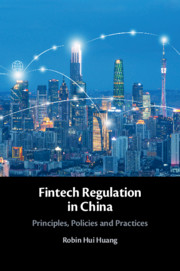Book contents
- Fintech Regulation in China
- Fintech Regulation in China
- Copyright page
- Dedication
- Contents
- Figures and Tables
- Foreword by Laurence Li SC
- Preface
- Acknowledgements
- Abbreviations
- 1 Introduction
- 2 Online P2P Lending
- 3 Initial Coin Offerings
- 4 Cryptoassets
- 5 Mobile Payment
- 6 Data Privacy in Mobile Payment
- 7 Robo-Advisors
- 8 Equity Crowdfunding and Central Bank Digital Currency
- 9 Conclusion
- Index
2 - Online P2P Lending
Published online by Cambridge University Press: 01 July 2021
- Fintech Regulation in China
- Fintech Regulation in China
- Copyright page
- Dedication
- Contents
- Figures and Tables
- Foreword by Laurence Li SC
- Preface
- Acknowledgements
- Abbreviations
- 1 Introduction
- 2 Online P2P Lending
- 3 Initial Coin Offerings
- 4 Cryptoassets
- 5 Mobile Payment
- 6 Data Privacy in Mobile Payment
- 7 Robo-Advisors
- 8 Equity Crowdfunding and Central Bank Digital Currency
- 9 Conclusion
- Index
Summary
China’s online P2P lending has undergone a roller-coaster period in the past decade with explosive growth initially to become the largest in the world currently. Online lending platforms have mushroomed across the country followed by a free fall in the past couple of years to see the market shrink drastically, with the closure or transformation of most of the platforms. The initial rapid development is a consequence of the simultaneous emergence of three key factors, namely deep penetration of internet, large supply of funds and unmet financial needs. In 2016, China issued an important regulation for online lending, introducing a number of significant measures, such as the restriction on the business model that can be adopted by platforms, registration requirements, custodian requirements, information disclosure requirements and lending limits. The regulation has far-reaching implications, including a reshuffling of the market and more collaboration between online lending platforms and traditional banks. However, now it seems that the regulation has failed to achieve its purposes, due to the problems with both substantive rules and enforcement mechanisms.
Keywords
- Type
- Chapter
- Information
- Fintech Regulation in ChinaPrinciples, Policies and Practices, pp. 14 - 51Publisher: Cambridge University PressPrint publication year: 2021



